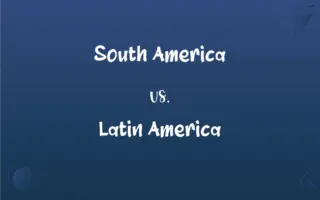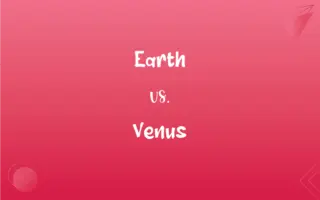Reality vs. Truth: What's the Difference?
Edited by Aimie Carlson || By Harlon Moss || Published on January 16, 2024
Reality refers to the state of things as they actually exist, irrespective of perception or belief. Truth refers to conformity to fact or actuality; a statement proven to be or accepted as true.

Key Differences
Reality refers to the actual state of a situation or existence, independent of one’s perception or belief. Truth, however, is the accuracy or correctness of a statement, idea, or belief in accordance with facts or reality.
Reality encompasses everything that physically exists, including tangible and observable phenomena. Truth is a concept that applies to statements, propositions, or beliefs, and is determined by their alignment with facts and reality.
Reality can be complex and multifaceted, sometimes beyond complete human comprehension. Truth, in contrast, is more definitive, often seeking to provide clear and factual understanding of a specific aspect of reality.
The study of reality falls into the realm of philosophy and science, exploring the nature of existence and the universe. The pursuit of truth is a key goal in disciplines like science, law, and journalism, focusing on uncovering and verifying factual information.
Comparison Chart
Definition
The state of things as they actually exist.
Conformity to fact or actuality.
ADVERTISEMENT
Dependence on Perception
Exists independently of perception.
Can be influenced by perception.
Scope
All that physically exists.
Applies to statements, ideas, or beliefs.
Subject to Verification
Not always verifiable, often just exists.
Often verified against facts and evidence.
Relevance in Disciplines
Explored in philosophy and science.
Central in science, law, and journalism.
Complexity
Can be beyond complete human comprehension.
Seeks clarity and factual understanding.
ADVERTISEMENT
Reality and Truth Definitions
Reality
The sum of all that is real and existent.
Virtual reality tries to simulate aspects of our physical reality.
Truth
The body of real events or facts.
Scientists seek the truth through rigorous testing and evidence.
Reality
A real situation or condition as opposed to what is imagined or hoped for.
The reality of working remotely differs from many people's expectations.
Truth
Conformity to knowledge, fact, actuality, or logic.
Philosophers have debated the nature of truth for centuries.
Reality
The actual state of a matter or situation.
The reality of climate change is evident in rising global temperatures.
Truth
The quality or state of being in accord with fact or reality.
The truth about historical events is often found in primary source documents.
Reality
Everything that exists independently of ideas or beliefs.
Understanding the reality of the universe is a fundamental goal of astronomy.
Truth
Honesty or accuracy in representation or reporting.
Journalistic integrity relies on reporting the truth.
Reality
The quality or state of being actual or true.
Truth
A fact or belief that is accepted as true.
It's a universal truth that all humans need food and water to survive.
Reality
One, such as a person, an entity, or an event, that is actual
"the weight of history and political realities" (Benno C. Schmidt, Jr.).
Truth
Conformity to fact or actuality
Does this story have any truth?.
Truth
Reality; actuality
In truth, he was not qualified for the job.
FAQs
What is truth?
Truth is the conformity of a statement, belief, or idea to facts or reality.
How does reality differ from truth?
Reality is the actual state of existence, while truth pertains to the correctness of beliefs or statements about reality.
Is reality always perceptible?
Not always; some aspects of reality may be beyond human perception or current understanding.
How is truth determined?
Truth is determined through evidence, logic, and sometimes consensus.
Can truth be subjective?
Yes, interpretations of truth can be subjective, but truth itself aims to reflect objective reality.
Does truth change over time?
Our understanding of what is true can change with new information or perspectives.
Is scientific truth absolute?
Scientific truths are based on current evidence and understanding, and can be revised with new discoveries.
What is reality?
Reality is the state of things as they actually exist, independent of perception.
Is truth always factual?
Truth aims to be factual, but it can be influenced by interpretations and perspectives.
Can a belief be a reality?
A belief represents a personal or collective understanding, which may or may not align with reality.
Does everyone perceive reality the same way?
No, perceptions of reality can vary based on individual experiences and understandings.
Can a lie become a truth?
A lie cannot become a truth, but beliefs about what is true can change.
Can reality be proven?
Some aspects of reality can be proven, while others are accepted as existing based on observation and understanding.
Can a statement be true but not reflect reality?
Statements can be considered true within a certain context or belief system, but may not align with the broader reality.
Are all truths universally accepted?
Not necessarily; truths can be disputed or interpreted differently across cultures or belief systems.
Can reality be subjective?
Individual perceptions of reality can be subjective, but reality itself exists independently of these perceptions.
What role do facts play in establishing truth?
Facts are crucial for establishing the truth, as they provide evidence and basis for true statements.
How do philosophers view reality and truth?
Philosophers explore and debate the nature, perception, and understanding of reality and truth, often without consensus.
Is our understanding of reality complete?
Our understanding of reality is continually evolving and may never be complete.
Is reality tangible?
Some aspects of reality are tangible, while others, like concepts or emotions, are intangible but still real.
About Author
Written by
Harlon MossHarlon is a seasoned quality moderator and accomplished content writer for Difference Wiki. An alumnus of the prestigious University of California, he earned his degree in Computer Science. Leveraging his academic background, Harlon brings a meticulous and informed perspective to his work, ensuring content accuracy and excellence.
Edited by
Aimie CarlsonAimie Carlson, holding a master's degree in English literature, is a fervent English language enthusiast. She lends her writing talents to Difference Wiki, a prominent website that specializes in comparisons, offering readers insightful analyses that both captivate and inform.






































































